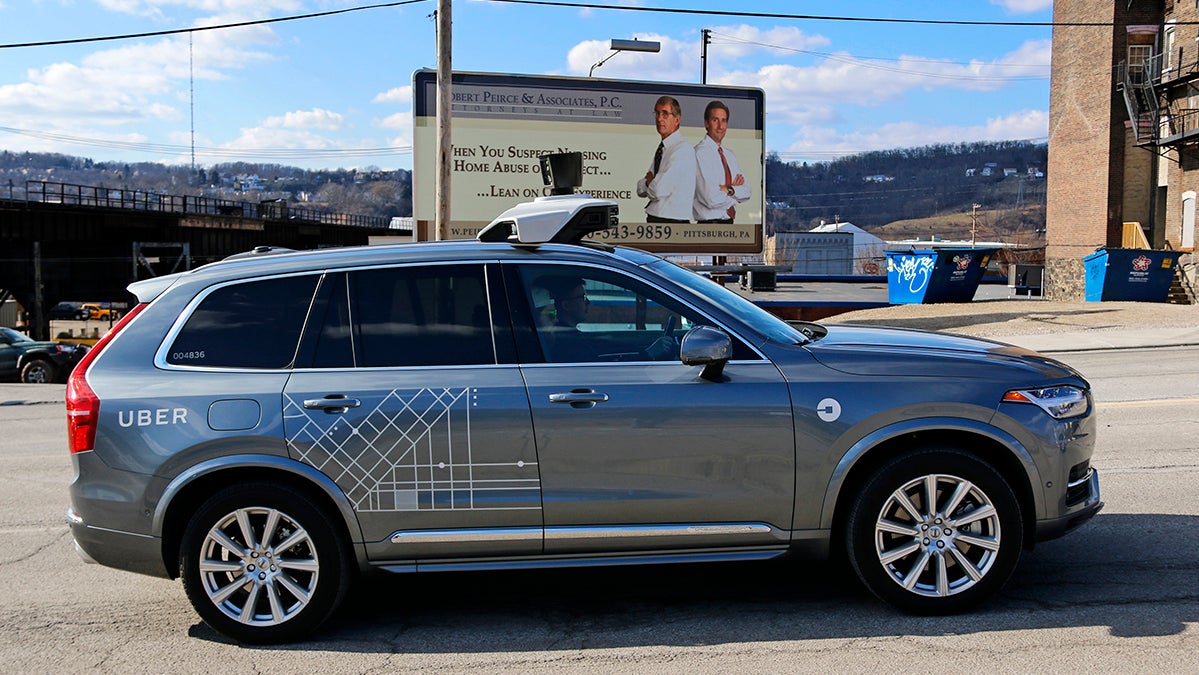Uber to pay $3.5 million to Pennsylvania over 2014 violations

One of Uber's self-driving cars rolls through Pittsburgh on March 17, 2017. The company has agreed to pay the state $3.5 million to settle a long-running dispute about its license to operate. (AP Photo/Gene J. Puskar)
The agreement resolves a more than two-year dispute between the company and the Public Utility Commission.
Ride-sharing and technology company Uber will pay $3.5 million into the state’s general fund to settle a long-running dispute with the Pennsylvania Public Utility Commission. Commissioners approved the settlement in a four to one vote Thursday. The civil penalty is one-third of the original $11.4 million fine levied against Uber.
Chairman Gladys Brown said in a statement that the case with Uber had been “intense, complex, and contentious.” She said the settlement represented “an acceptable solution” and would allow PUC to avoid litigation.
A release from the agency said the settlement resolves any issues relating to Uber’s initial entry into the state. The company operated for six months without a license in 2014, and a month after a cease-and-desist order.
Both Uber and Lyft began offering rides in Pennsylvania in 2014, and did so without state approval. While Lyft settled with the PUC for $250,000 in 2015, Uber did not. The company was accused of obstructing an investigation into their operations, and they were ultimately fined a record $11.4 million dollars. Uber appealed that decision.
The $3.5 million penalty is too high, Commissioner Robert F. Powelson said in a statement. Despite similar infractions, Uber and Lyft received very different treatment, he said. “We cannot forget that when Uber and Lyft began offering TNC [Transportation Network Company] service, it was not clear that the companies were in fact operating illegally. In 2014, no Pennsylvania law or portion of the Commission’s regulations addressed TNC service.”
Commissioner John F. Coleman, Jr. disagreed. He said in a statement that Uber’s penalty is too low, given the company’s “record number of violations,” and “unwavering propensity to operate illegally.”
An Uber spokesperson said, “We are glad to have reached a resolution with the PUC.”
Governor Tom Wolf signed ride-sharing into law in November 2016, making Uber a licensed TNC operator subject to PUC regulation.
The company has raised eyebrows, and tempers, in Pittsburgh, where it is working on its autonomous vehicle technology.
Mayoral spokesperson Tim McNulty said, “The city has long supported reasonable regulation that allows ride-sharing companies to grow, as long as safety for passengers and drivers is assured, and drivers are treated responsibly in this new economy.”
PUC officials would not comment beyond released statements.
Uber has 45 days to send payment, which will go to Pennsylvania’s general fund.
WHYY is your source for fact-based, in-depth journalism and information. As a nonprofit organization, we rely on financial support from readers like you. Please give today.


